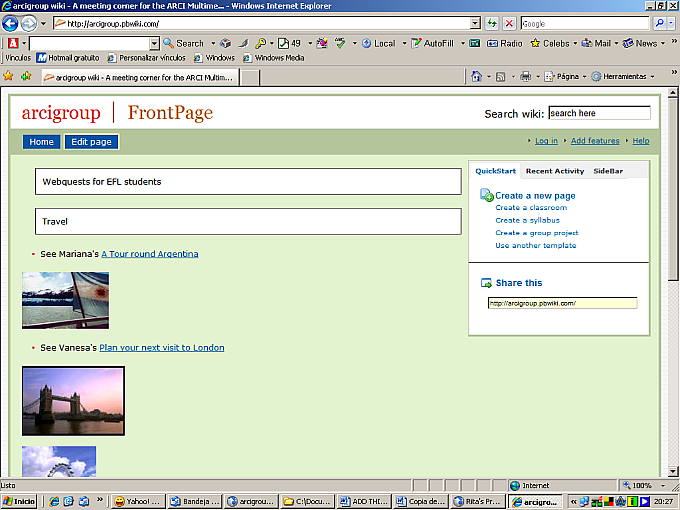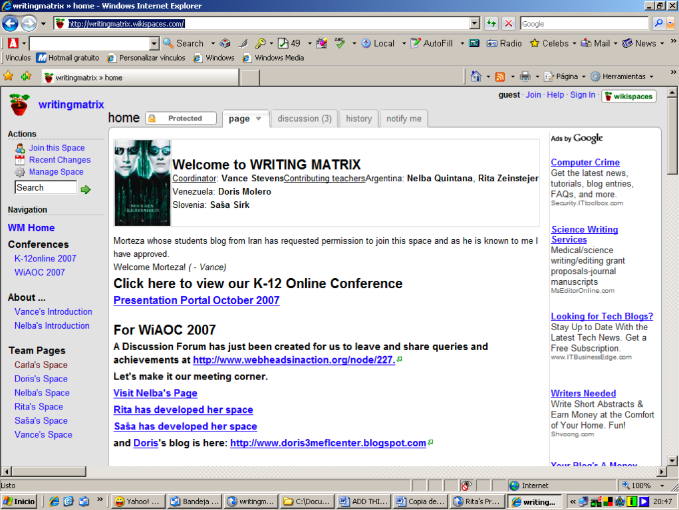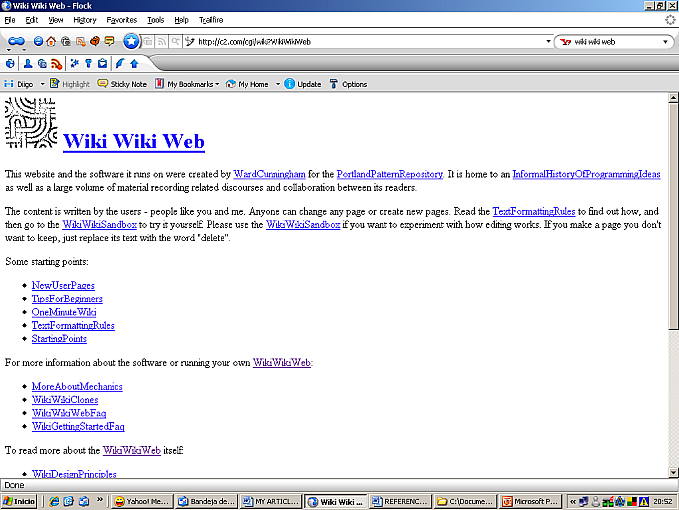
March 2008
Volume 11, Number 4
| Contents | | | TESL-EJ Top |
 |
March 2008
|
||
|
| Titles: |  |  |
| Homepage: | http://www.wikispaces.com | http://pbwiki.com/ |
| Product type: | Wiki (editable, collaborative websites) | |
| Platform: | All platforms; free software; not downloadable | |
A "wiki" can be described as a piece of server software that allows users to freely create, edit, delete, and/or modify web page content using a web browser. The first wiki creator, Ward Cunningham, used the word "wiki" to describe the collaborative tool he developed. He named the site after a chain of buses in Hawaii (Wiki means "quick" in Hawaiian). In an interview, Cunningham (2003) states, "My specific purpose for the first wiki was to create an environment where we might link together each other's experience to discover the pattern language of programming. A wiki is always in the process of being organized. But for every hour spent organizing, two more hours are spent adding new material. So the status quo for a wiki is always partially organized. "
Wikis are people-centered tools which have no built-in hierarchy or arborescence. Wiki authors can create one very long page or as many other interlinking pages--subcategories, directories, or links--as they please. The arrangement, organization, or content can easily be undone or redone by anybody, so it can be said that a wiki is a "shared repository of knowledge with the knowledge base growing over time" (Godwin-Jones, 2003).
Despite predictions that allowing large numbers of people to edit web pages or documents would lead to chaos and misuse, wikis have managed to keep their identity as one of the most collaborative and richest tools in cyberspace. For example, Wikipedia, perhaps the best known example of a wiki, has managed to create one of the most useful repositories of knowledge anywhere by using the wiki format, the knowledge of contributors, and a minimum amount of central oversight.
In sum, a wiki is a collection of web pages which can be edited by anyone, at any time, from anywhere. Before explaining why and how language teachers can make use of such a platform, it is necessary to differentiate wikis from another commonly used type of application: weblogs, or "blogs."
Whereas blogs have already become familiar in the pedagogical arena, wikis are just beginning to be used by EFL/ESL teachers. While both allow users to create content to be shared with other users, there are a number of differences between blogs and wikis. Table 1 below highlights the differences between the two.
Table 1. Differences between Blogs and Wikis
| Blogs | Wikis |
|---|---|
|
|
From Table 1, we can see that if one is mostly interested in having a one-way conversation (with perhaps some responses in a comments section), then blogs may be the way to go. However, if one is interested in creating content collaboratively with students or colleagues, then a wiki might be worth considering.
As teachers, we can use wikis . . .
One recent activity using wikis involved having learners write about topics in which they were interested after engaging in "webquests" [http://webquest.org] in order to find relevant information. After posting their reports to the wiki, other users could view and edit them as necessary. Figure 1 below shows one page of this activity.

Figure 1. EFL teachers created this wiki to list webquests for upper-intermediate students
In addition to using wikis for classroom purposes, teachers can also use wikis for professional development activities. Personally, wikis have proved very effective and successful for my collaborative projects with colleagues, where all members felt an intrinsic motivation to learn and to share content knowledge together. As a CALL special interest group (SIG) coordinator in my area, I created a wiki (see Figure 2 below) that allowed members of this group to collaborate and share ideas related to CALL.

Figure 2. A pbwiki page showing all changes sorted by dates
In this wiki, the different revisions with their links can be seen clearly, sorted either by date or name, including names of postings, dates, and the possibility of deleting or renaming them. In this case, all group members with whom the author has shared the password can modify content. However, only the person who created this wiki can change the password. If the creator changes the password, he/she will make the wiki inaccessible to anyone who only has the old password, so it is important to make sure all members know about the change. Figure 2 shows how a wiki can be used to collaborate with colleagues.
Another example (Figure 3 below) of using a wiki for professional development and collaboration involved participants sharing their thoughts and work on a research project on the topic of "tagging" and language learning. Despite geographical distances and time differences, a wiki gave us the best possibility to work from our places; it helped generate activity letting all the people involved see what each one was doing. It also allowed us to provide feedback, to write and re-write, to discuss content, and come to agreements through a link to a discussion forum. In a nutshell, it allowed us to work collaboratively towards a common product.

Figure 3. EFL Teachers are running this project on writing and the use of "tagging" for language learning, at wikispaces
Not only students but also teachers working with wikis will need to acquire and develop different skills, as learners will demand assistance, prompting, and scaffolding. Students' individual work will need to be monitored, evaluated, and, if needed, re-directed into creative, fruitful interaction in the pursuit of collective production, which will also expand and enhance teachers' professional repertoire and experience.
Furthermore, wikis work most effectively when students can assert meaningful autonomy over the process. This is a crucial issue all teachers should remember to share with their students. Reminding them of the importance of the responsibility involved in posting as well as the responsibility in their own process of personal development is a must before plunging into any kind of online collaborative project. In fact, teachers who advocate student-centered methodologies will undoubtedly find in wikis the perfect tools for authentic, independent confluence of views towards collaborative work. In wikis, the process is the product, and the end product is the result of the group interaction.
If you have decided that you are interested in learning more, the next step is to take a look at some wikis. Potential users might want to browse some wiki pages at either pbwiki or at wikispaces and take a tour. Searching on Google will also yield views of different wikis on the web. Perhaps the best way to start a hands-on experience would be to visit the Wiki Wiki Web [http://c2.com/cgi/wiki/] (Figure 4), a public wiki which allows anyone to change any page or create new pages, and to experiment with how editing works. You will also find rules and tips on how to run your own wiki.

Figure 4. The Wiki Wiki Web, where users can learn through doing
There is also a good video which guides viewers through the first steps of starting a wiki at YouTube.
For readers who are ready to start their own wikis, both previously mentioned hosts, wikispaces and pbwikis, are very good choices. Both are user friendly and totally free. Go to http://en.wikipedia.org/wiki/List_of_wiki_farms/ for an extremely comprehensive comparison of available wikis.
As Harnad (1982) states, "All advocates of constructivism agree that it is the individual's processing of stimuli from the environment and the resulting cognitive structures, that produce adaptive behavior, rather than the stimuli themselves." As with the advent of the constructivist approach, the emergence of wikis into the educational world poses certain imperative conditions which educators need to be conscious of to be able to shift from the traditional role which empowers their professional status to that of an "instructor" or "mediator" able to motivate learners into action by bringing up problems and dilemmas, by setting the scene, and by relinquishing their powerful position in order to allow students to gain autonomy, acquire independence, and become creative users of tools like blogs and wikis, which have become distinctive features of course management systems in the communication era we are all living.
A Conversation with Ward Cunningham. (2003, September 26). In Wikipedia, the free encyclopedia. Retrieved January 10, 2008, from http://en.wikiquote.org/wiki/Ward_Cunningham#A_Conversation_with_Ward_Cunningham_.282003.29
Godwin-Jones, R. (2003). Emerging technologies: Blogs and wikis: Environments for on-line collaboration. Language Learning & Technology, 7(2), 12-16. Retrieved January 11, 2008, from http://llt.msu.edu/vol7num2/emerging/
Harnad, S. (1982). Neoconstructivism: A unifying theme for the cognitive sciences. In T. Simon & R. Scholes (Eds.), Language, mind and brain. (pp. 1-11). Hillsdale, NJ: Erlbaum.
Rita Zeinstejer is an EFL teacher in Argentina, with 30 years' experience teaching English at all levels, mainly preparing students for Cambridge FCE and CAE. She is also a Cambridge Oral Examiner, and works as Area Manager for Advanced Courses, and as Self Access, Laboratory and Multimedia Coordinator at Asociación Rosarina de Cultura Inglesa. Rita has been coordinating her local CALL SIG for 6 years now, and has given many presentations on information and communication technology (ICT) and computer mediated communication (CMC) for language learning in Argentina and in Brazil. As a member of "Webheads in Action," an online community of practice researching CMC tools for language learning, she has participated in online conferences and congresses, as well as in TESOL, IATEFL, FAAPI, and LABCI Conventions.
http://www.zeinstejer.com
email: rita@zeinstejer.com
|
© Copyright rests with authors. Please cite TESL-EJ appropriately.
Editor's Note: The HTML version contains no page numbers. Please use the PDF version of this article for citations. |